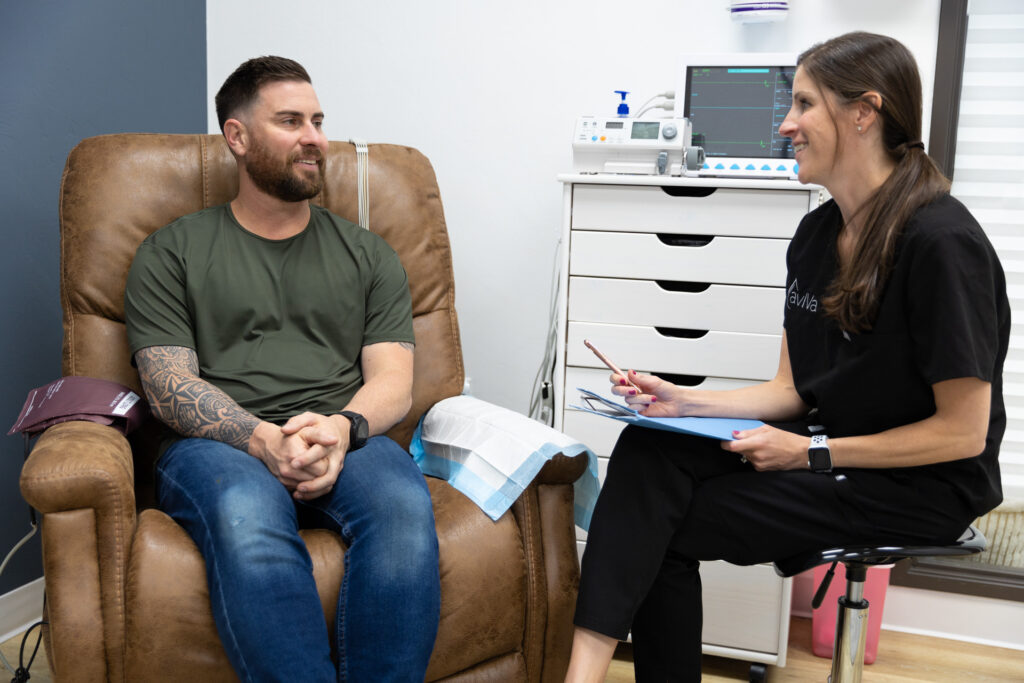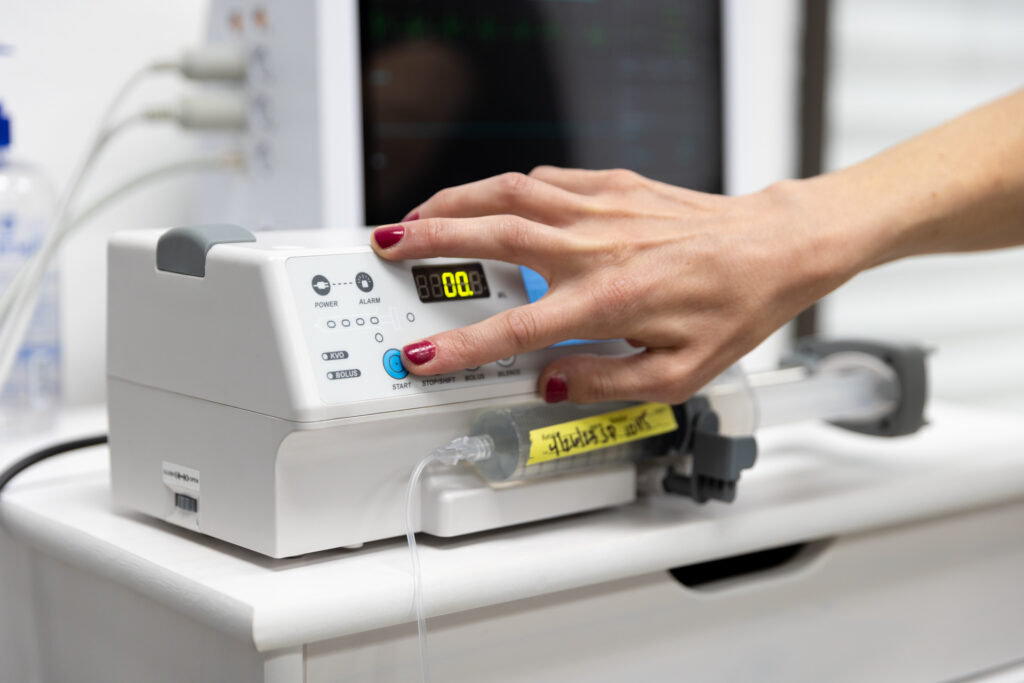Kick start your mental health at avIVa Infusions
Ketamine as an Anxiety Treatment
Fast and efficient relief for major anxiety disorders.
At avIVa Infusions, we are proud to offer the latest in mental health treatment options.
In addition to high levels of safety standards and patient care, avIVa Infusions utilizes ketamine infusion therapy for the treatment of anxiety, as well as other mood disorders like depression, PTSD, and OCD.
Our mission statement at avIVa Infusions is to provide personalized, high-quality management options for people struggling with treatment-resistant conditions. Ketamine infusions have proven to be a powerful and rapid treatment for anxiety and other mental health conditions.
Treatment Details
Consultation Required?
Yes
Downtime:
Unable to drive for 12 hours
Sessions Needed:
6 loading doses
Results Duration:
One infusion booster every 4-12 weeks
What it Treats
Treatment-resistant depression
Suicidal ideation / suicidal thoughts
Insomnia
Lack of appetite
Trouble focusing
Feelings of emptiness, sadness, and hopelessness
Loss of interests in hobbies
Ketamine therapy for anxiety in Green Bay
Effective Against Anxiety
Ketamine for anxiety treatment offers fast and efficient relief from the symptoms of anxiety disorders or mental health conditions, with up to 75% of patients reporting a positive response to just a single ketamine infusion.
Fast Relief
With traditional treatments for anxiety disorders, it can sometimes take weeks or even months before you experience symptom relief. Ketamine is an exciting new treatment option because in some cases it can provide relief from anxiety symptoms within days or even hours.
Real Results
In multiple trials, those with major anxiety found that ketamine infusions were particularly effective in treating their symptoms. This indicates that ketamine is a viable treatment for those with depression or anxiety, especially in cases that do not respond to traditional medications.

Lifestyle Changes & Ketamine Therapy
The Path to Healing from Anxiety
There are certain lifestyle changes that can be made that are very useful when combined with a treatment like ketamine infusion.
Exercise
Research shows that regular exercise, between 30 to 60 minutes of physical activity a day, can be just as effective as medication when treating anxiety disorders. Exercise boosts important “feel good” chemicals like serotonin and endorphins, but it also triggers the growth of new connections between brain cells. Fortunately, even a half-hour daily walk can start to improve your symptoms.
Social Support Networks
A strong social support network can reduce the feelings of isolation that anxiety disorders are known to bring about. You should consider joining a class or group for a hobby you enjoy or volunteering with a local charity or foundation, as well as keeping in regular contact with your close friends and loved ones.
Nutrition
Even people without an anxiety disorder should strive to eat well – it’s good for not just physical health, but mental health as well. Try to eat smaller but well-balanced meals throughout the day to keep your energy up and combat mood swings.
Sleep
Sleep strongly affects your mood, and when you are not getting enough of it you may find yourself irritable, grumpy, fatigued, or unusually sad. Generally speaking, everyone should sleep somewhere between seven to nine hours every night.
Stress Reduction
Anything you can do to reduce stress will help your anxiety symptoms. Stress not only worsens the symptoms of your anxiety disorder but may also put you at risk of developing one in the future. Seek out ways to manage the stress in your life, such as an unhealthy relationship or work-related stress.
Frequently Asked Questions
- What causes anxiety?
-
What leads a person to develop an anxiety disorder is still not fully understood by the medical community. Traumatic events or life experiences may trigger anxiety disorders in those already prone to them, but inherited traits can also be a factor.
In some cases, the anxiety disorder may be linked to underlying health issues. In other cases, symptoms of anxiety can be the first indicators of another sort of medical condition.
Examples of other conditions sometimes linked to anxiety include:
- Heart disease
- Diabetes
- Thyroid problems (for example, hyperthyroidism)
- Respiratory disorders like COPD or asthma
- Drug abuse or withdrawal
- Withdrawal from alcohol, benzodiazepines, or other medications
- Chronic pain
- Irritable bowel syndrome
It is also possible that your anxiety may be caused by an underlying medical condition if:
- You do not have any blood relatives with an anxiety disorder
- You did not have an anxiety disorder as a child
- You do not avoid certain things or situations because of anxiety
- You have a sudden occurrence of anxiety that seems unrelated to life events
- There are different types of anxiety disorders?
-
Generalized Anxiety Disorder (GAD)
Characterized by chronic anxiety and exaggerated worry and tension, even if there is little or nothing to provoke it.
Obsessive-Compulsive Disorder (OCD)
Known for the intrusive thoughts (obsessions) that come along with this disorder, as well as repetitive behaviors (known as compulsions). These compulsions, or “rituals,” are developed as a way for someone with OCD to cope with the obsessive thoughts they experience. However, this typically only offers temporary relief, and can even make the anxiety worse over time.
Panic Disorder
Known for intense moments of fear that are made obvious through physical symptoms, like dizziness, stomach troubles, shortness of breath, chest pain, and/or heart palpitations.
Social Anxiety Disorder (SAD)
Known for the intense fear brought on by social situations, like shopping, public speaking, playing a sport, or simply being around other people in small, controlled settings.
Agoraphobia
Known for the intense fear formed from certain situations or places. Causes the suffer to go out of their way to avoid the things that trigger their anxiety.
- What are the risk factors for anxiety?
-
The following factors may increase your risk of developing an anxiety disorder:
- Trauma. Children or adults who experience traumatic events can go on to develop anxiety disorders
- Stress from an illness. A serious health condition can cause significant worry.
- Personality. Some specific personality types are more prone to anxiety disorders.
- Other mental health disorders. Other conditions like depression often go hand-in-hand with anxiety disorders.
- Family history of anxiety disorders. Anxiety disorders often run in families.
- Drug or alcohol abuse. Substance abuse has been shown to worsen the symptoms of mood disorders.
- How does ketamine help with anxiety?
-
Research into IV ketamine infusions for the treatment of anxiety is still ongoing, but the current understanding is that ketamine can bind to receptors in the brain and increase the amount of glutamate, a neurotransmitter. This will set off a chain of reactions in the brain and impact emotional regulation.
To put this in layman’s terms, ketamine allows the brain to trigger hormones that create more positive emotions. One added benefit of ketamine infusion is that relief can occur within minutes rather than the weeks or months an antidepressant or therapy may take.
- Is ketamine therapy painful?
-
Ketamine therapy is not painful. While this treatment for anxiety does require a needle, the needle is small, insertion is fast, and patients report minimal-to-no discomfort.
Get Started
Tell us more about you and your needs using our Virtual Consultation Tool.
Input your concerns, and we’ll provide custom treatment recommendations for your unique needs.


